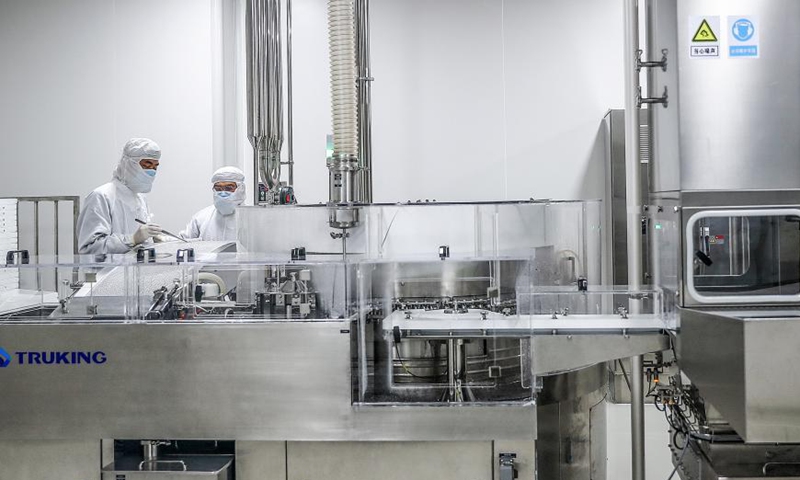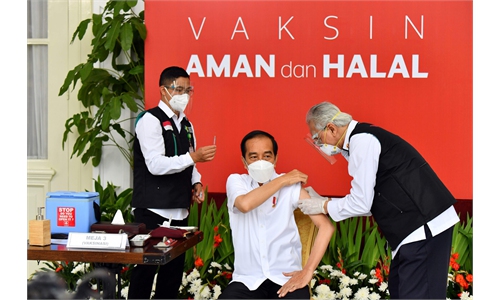
Staff members check automated vial cleansing line and tunnel drying oven at the COVID-19 vaccine workshop of Sinovac Life Sciences Co., Ltd. in Beijing, capital of China, Jan. 6, 2021.
With worrisome signs that some recent coronavirus mutations may dampen the effectiveness of current vaccines, US drugmaker Moderna and Oxford scientists are mulling new vaccines to tackle mutant strains. Meanwhile, concerns have emerged in China as to whether there's a need to update vaccines and whether vaccine exports will be affected.
Moderna launched a trial for a new COVID-19 vaccine to tackle the mutation that spread in South Africa, after signs showing that current doses can produce only one-sixth the level of antibodies in response to the South African variant, compared with the original strains, media reported on Monday.
Lab studies so far proved that Chinese vaccines' levels of induced antibodies almost remained steady in neutralizing the mutations seen in Europe, South America, and the US across the first half of 2020, Shao Yiming, one of the chief medical advisors for the research and development of Chinese COVID-19 vaccines, also a member of the Product Development for Vaccine Advisory Committee of the World Health Organization (WHO), told the Global Times.
However, Shao warned that variants found in the UK and South Africa in more recent days could curb the effectiveness of the vaccines.
Similarly, studies published last week show that the variant identified in South Africa is less susceptible to the antibodies created by natural infection and also by vaccines made by Pfizer-BioNTech and Moderna.
But there is no sign that would prompt an urgent upgrade of the vaccines made in China so far, Shao said, as the current ones still offer protection for ordinary people.
Jin Dongyan, a biomedical professor at the University of Hong Kong, told the Global Times on Tuesday that all those vaccine candidates could still offer enough protection, noting that global deals will not be affected because of such concerns.
The vaccine's efficacy against the Brazilian variant is unknown as Chinese scientists who developed the vaccine had never obtained the variant strain, the Global Times learned from industry insiders.
Deals between China and Brazil seem to be going ahead, as Brazil's President Jair Bolsonaro thanked China on Monday for rapidly approving exports of 5,400 liters of supplies of Sinovac's COVID-19 vaccines, coming in the next few days. Brazil has been scrambling to secure doses for its national vaccination campaign.
All existing global COVID-19 vaccines are designed based on the sequence of the virus revealed in Wuhan last year.
Chinese scientists are working with vaccine producers to study mutations, and lab studies are underway to understand the potential threat to Chinese vaccines. The results are not absolutely "ineffective" or "effective," but there are percentage changes in the protection rates, Shao noted.
If an upgrade is required, Chinese manufacturers are able to redesign an inactivated vaccine against a mutant in as little as two months, with the only key change being the replacement of the original seed virus with the mutated one, according to the expert.
A source at China's leading producer Sinovac told the Global Times that preliminary results showed that antibodies produced by Sinovac's inactivated vaccine can neutralize the UK and South African variants, though the person did not give specific percentages. A detailed report by scientists will be published later.
The source said that Chinese producers' overseas buyers have not been deterred, as the Chinese vaccine is still an effective tool to curb the virus in those countries.
Chinese citizens are among those most enthusiastic to be vaccinated against COVID-19 across 15 major countries, according to a recent Ipsos survey.
In the survey, 83 percent of Chinese respondents said that they agreed or strongly agreed that they would take a shot of a COVID-19 vaccine. The two countries with the strongest willingness to take the vaccines were Brazil and the UK, with 86 percent of respondents saying they would do so.
Some are worried that ever-changing strains may deter people from taking part in the national immunization plan. Jin advised the public not to worry too much about the influence of virus mutations on vaccines, saying that China could use synthetic virus variants, given genomic sequences globally, to further test vaccine efficacy changes, if necessary.
Shao suggested that coronavirus vaccines in long-term development should cover more variants, considering that it is hard to predict which virus will cause an epidemic. It is also advisable to establish a global, regular monitoring network for updating and sharing information on coronavirus variants.

